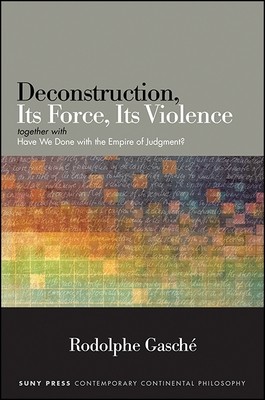
- We will send in 10–14 business days.
- Author: Rodolphe Gasché
- Publisher: State University of New York Press
- ISBN-10: 1438460007
- ISBN-13: 9781438460000
- Format: 13.7 x 21.3 x 1.3 cm, minkšti viršeliai
- Language: English
- SAVE -10% with code: EXTRA
Reviews
Description
In this book, Rodolphe Gasché returns to some of the founding texts of deconstruction to propose a new and broader way of understanding it--not as an operation or method to reach an elusive outside, or beyond, of metaphysics, but as something that takes place within it. Rather than unraveling metaphysics, deconstruction loosens its binary and hierarchical conceptual structure. To make this case, Gasché focuses on the concepts of force and violence in the work of Jacques Derrida, looking to his essays Force and Signification and Force of Law, and his reading on Of Grammatology in Claude Lévi-Strauss's autobiographical Tristes Tropiques. The concept of force has not drawn extensive scrutiny in Derrida scholarship, but it is crucial to understanding how, by way of spacing and temporizing, philosophical opposition is reinscribed into a differential economy of forces. Gasché concludes with an essay addressing the question of deconstruction and judgment and considers whether deconstruction suspends the possibility of judgment, or whether it is, on the contrary, a hyperbolic demand for judgment.
EXTRA 10 % discount with code: EXTRA
The promotion ends in 22d.11:32:29
The discount code is valid when purchasing from 10 €. Discounts do not stack.
- Author: Rodolphe Gasché
- Publisher: State University of New York Press
- ISBN-10: 1438460007
- ISBN-13: 9781438460000
- Format: 13.7 x 21.3 x 1.3 cm, minkšti viršeliai
- Language: English English
In this book, Rodolphe Gasché returns to some of the founding texts of deconstruction to propose a new and broader way of understanding it--not as an operation or method to reach an elusive outside, or beyond, of metaphysics, but as something that takes place within it. Rather than unraveling metaphysics, deconstruction loosens its binary and hierarchical conceptual structure. To make this case, Gasché focuses on the concepts of force and violence in the work of Jacques Derrida, looking to his essays Force and Signification and Force of Law, and his reading on Of Grammatology in Claude Lévi-Strauss's autobiographical Tristes Tropiques. The concept of force has not drawn extensive scrutiny in Derrida scholarship, but it is crucial to understanding how, by way of spacing and temporizing, philosophical opposition is reinscribed into a differential economy of forces. Gasché concludes with an essay addressing the question of deconstruction and judgment and considers whether deconstruction suspends the possibility of judgment, or whether it is, on the contrary, a hyperbolic demand for judgment.


Reviews